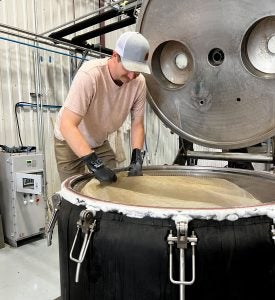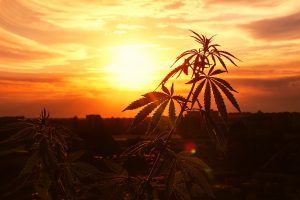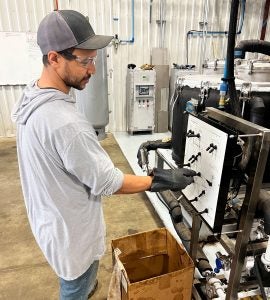Exciting times are often the most uncertain, and yet these make for the best opportunities. Into the burgeoning hemp industry comes FLM Hemp Solutions at a time of unparalleled opportunity for cannabidiol (CBD) use, mixed with the economic uncertainties of a dynamic world.
Co-founder and President Zach Frazee said his startup hemp processing facility near Indianapolis’ rural northwest side is running full speed in early 2022, and he is eager for more producers get into the game.
“We can produce between 15,000 and 20,000 pounds every 10 days,” he said, noting that’s with just one shift working. He’s presently seeking workers so as to expand to a second.
FLM Hemp Solutions produces winterized decarboxylated crude oil from hemp using a sub-zero alcohol extractor. The process utilizes a food-grade isopropyl which Frazee said offers numerous advantages over CO2 extraction as it eliminates the need for dewaxing and winterizing by way of a separate process. This biomass-to-crude oil process recovers more than 98 percent of the solvents, meaning a solid product is then sent to market and used in any number of ways.

But, as both Frazee and Don Robison with the Office of the Indiana State Chemist affirmed, the number of hemp growers for CBD purposes has decreased sharply in Indiana over the past three years since the legalization of growing, from more than 400 to about 40. Meanwhile, opportunities for use of the product continue to boom, and there is great hope that these phenomena can work together to produce a vibrant industry nonetheless.
Why CBD?
The fact is, CBD and hemp have a number of established uses, particularly by way of health and wellness. Whether as an anti-inflammatory for pain management, anti-anxiety, or anti-seizure purposes, it’s a popular product with growing demand. Analysts note that total global market for CBD could reach as high as $47.22 billion by 2028, up from $4.9 billion in 2021.
Unlike its plant cousin which produces a high, the CBD product itself exhibits no such effect. According to studies published by Harvard Medical School, research affirms that chronic, low-grade inflammation can result in a number of chronic illnesses, and CBD has potential to help with anxiety, insomnia, chronic pain, arthritis, and perhaps even some addictions.
The big challenge for research and industry alike at present is quality control. Whereas hemp was once widely grown throughout the country, in 1971 the U.S. federal government classified cannabis as a Schedule 1 drug as part of the battle against marijuana, sweeping into that ruling industrial hemp, which does not produce sufficient amounts of the psychoactive compound tetrahydrocannabinol (THC) to make is a drug in that sense.

This effectively shut down hemp production in the U.S. until the 2018 Farm Bill was signed into effect changing this law.
And there were a number of good business reasons for this. Despite the ban on growing hemp, the U.S. imported $67.3 million worth of hemp seed and fiber products in 2017, and even then the CBD market alone was worth nearly $200 million. But U.S. producers have to effectively re-learn the art and science of growing hemp, and that includes seed quality and farming practices.
New industry
FLM Hemp Solutions and other processors like it are a necessary part of the new industry as they provide a market for the grower’s product. Imagine corn-growers without a market to process their product. And as a new industry, seed quality has come to be an issue for both growers and producers alike.
Frazee explained that CBD hemp plants are graded and bought by potency-as-quality, much like hay.
“There’s definitely different quality,” he said. “We like to run above 8 percent or better.”
But when producers first lined up to jump into the market in 2019, knowledge of seed genetics was limited and quality was really all over the board. A producer might buy seeds thinking he was going to have 10 percent potency but only end up with 4 percent. Or worse, the seeds might yield a THC level in excess of federal regulations and the entire crop could be destroyed. Some of that was due to accident, some was due to disreputable seed dealers, Frazee said. The end result was a lot of nervous farmers.

Robison’s office has been addressing the issue from the start, and, as the state’s Seed Administrator, he maintains a list of approved seed dealers, licenses, and permits. Growers interested in procuring quality seeds are free consult his office, contained within Purdue University, for more information.
Frazee, a lifelong agricultural producer himself in vegetables and pumpkins, began researching the prospects of a hemp processing plant in 2019 upon the plant’s legalization. Equipment was ordered in 2020, in the midst of the COVID-19 pandemic. Installation was delayed until spring of 2021, but finally operation came underway later that fall. And now he’s looking to take on more clients.
“My take on it is, once it became legal federally in 2019, everyone jumped in and started growing hemp. But there was a lack of infrastructure,” he said, explaining that FLM Hemp Solutions is an answer to that need.
A big driver of FLM Hemp Solutions is the concept of trust. As an ag producer himself, Frazee said farmers have to be able to trust their producers with their product, particularly when contract sales come into play. With the extraction equipment needed to get the oil out of the hemp plant, farmers have a number of different options for selling their materials.
For instance, producers can either sell the biomass to FLM Hemp Solutions or have the company process the oil for them and then take it for their own re-sale. Whether to utilize a toll processing or a split deal, farmers are still learning the ropes on how to maximize profits with hemp and CBD. Just like at a co-op where corn and soybeans are weighed, graded, and brokered, farmers have to trust their producers and those relationships do take time.
Located just outside Indianapolis, Frazee said he’s getting materials from Kentucky, Illinois, Tennessee, and as far away as North Carolina, and he’s looking for more.
Big potential
The potential is undeniable for producers with the kind of ground needed for hemp. Better grown on ground that might make for poor corn or soybean production, much like hay, hemp can be a great supplement to an existing operation, or a nice side business for an agricultural enthusiast.
From clothing to rope, the plant itself contains a multitude of uses. And as a health and wellness product, CBD oil shows no signs of falling in demand.
Brian Boyce is an award-winning writer living on a farm in west-central Indiana. You can see more of his work at http://www.boycegroupinc.com/.



